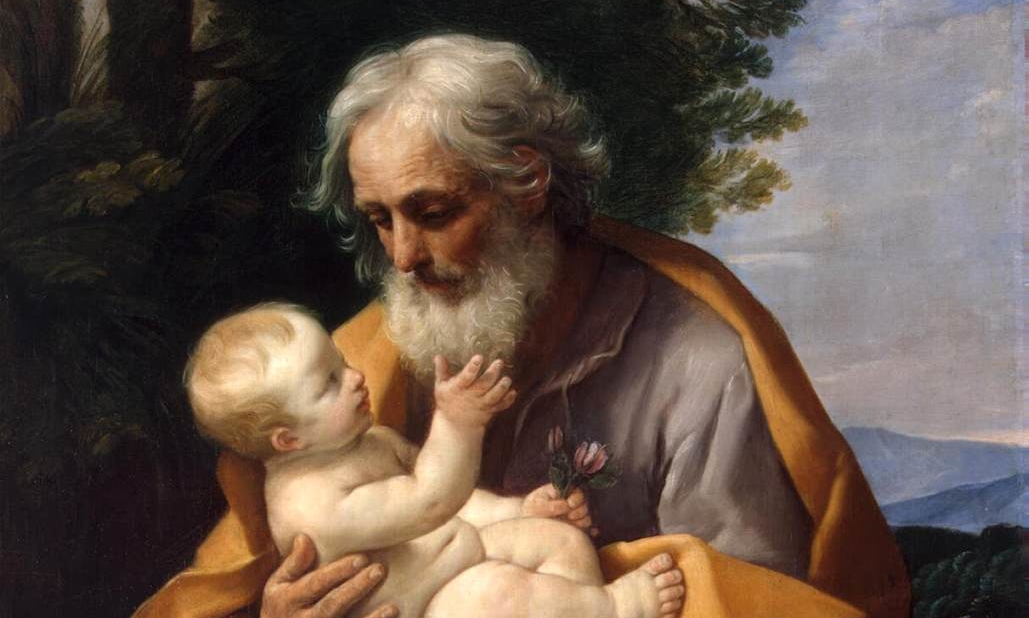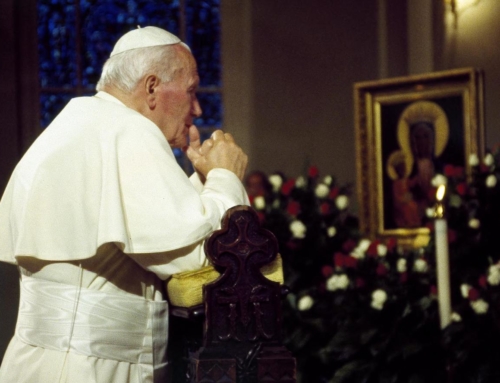Ite Ad Joseph. “Go to Joseph.”
These were the words of Pharaoh to the people of Egypt during the years of famine (Gen 41:55). These are the words inscribed at the base of the statue of St. Joseph in front of St. Joseph’s Oratory of Mount Royal. This Oratory was founded by St. André Bessette, who obtained many miraculous healings through the intercession of St. Joseph.
By declaring St. Joseph, the husband of Mary, the universal patron of the Catholic Church, the Catholic Church tells us to go to St. Joseph in our times of need as well. We can draw much spiritual fruit from considering the first Joseph, the son of Israel, as a type of Joseph, the husband of Mary. Psalm 105 below summarizes nicely the important facts of the ancient Joseph’s life:
When [the Lord] summoned famine against the land,
and broke every staff of bread,
he had sent a man ahead of them,
Joseph, who was sold as a slave.
His feet were hurt with fetters,
his neck was put in a collar of iron;
until what he had said came to pass,
the word of the Lord kept testing him.
The king sent and released him;
the ruler of the peoples set him free.
He made him lord of his house,
and ruler of all his possessions,
to instruct his officials at his pleasure,
and to teach his elders wisdom. (Ps 105:16-22)
The first part of the above passage describes a land beset by famine. In the times of Joseph of the Old Testament, people everywhere lacked food, but God provided for them through Joseph. In the Gospels, Jesus Christ is born as an infant who needs to be fed, and just as the people of Egypt sought food from Joseph, the head minister of Pharaoh’s household, so Jesus goes to Joseph, whom God has set over his own household, to receive the necessities of earthly life.
The description of Joseph bound in fetters and an iron collar is evocative of the bonds of sin. However, it has long been the tradition of the Church that St. Joseph, the husband of Mary, never committed a single actual sin; however, unlike Mary he was not immaculately conceived, and he came into being with the fetters of original sin. Yet, just as the king released Joseph, the son of Israel, from his bonds and set him over his household, so also God released Joseph, the husband of Mary, from his bonds of sin and set him over the Holy Family as its head.
And just as through Joseph, the son of Israel, God provided food for the starving people of Egypt and his family, so through Joseph, the husband of Mary, did God the Father provide for the needs of Jesus. In formation houses of the Dominican province of St. Joseph, there is a tradition of singing an antiphon at dinnertime that honors St. Joseph: Ecce fidelis servus et prudens, quem constituit Dominus super familiam suam. It translates to “Behold! A faithful and prudent servant, whom the Lord placed over His household.” This antiphon reminds us of the trust which God placed in St. Joseph to manage His household. Further, since it is prayed at dinner, it reminds us that Joseph, by his prayers, obtains for us those good things we need, such as the food we’ve just eaten. For just as St. Joseph watched over and cared for Mary, St. Joseph similarly watches over and cares for the Church, whom Mary represents, and all Christians belonging to it. If God the Father was pleased to provide for His Son, Jesus, through St. Joseph, then we can be confident that if we turn to St. Joseph as God’s faithful steward we will not lack for anything. In times of distress, go to Joseph.
✠
Image: Guido Reni, St Joseph with the Infant Jesus







